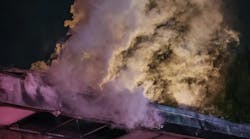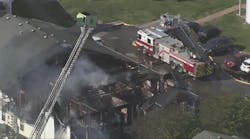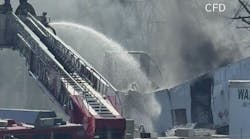In the mid-1980s, sports psychologist Gary Mack and I authored the first edition of The Mental Aspects of Performance. The first M.A.P. was on the market for 12 years. In October 2002, Gary and I decided to create the second edition of the book, but a week after that decision was made, Gary died from a heart attack. The following year, I decided to take the project on anyway, as a tribute to Gary.
With the help of many people, the new M.A.P. is a reality. This new edition, titled The Mental Aspects of Performance for Firefighters and Fire Officers (The M.A.P.), is published by Fire Protection Publications at Oklahoma State University, and represents a complete restructuring and rewrite of the original book. Gary is still identified as the co-author because his beliefs and concepts remain at the core of The M.A.P.
Gary Mack often said that “excellence has as its basis a fundamental belief in the power of individual potential.” The M.A.P., with the concepts, exercises and skills it contains, will help firefighters and fire officers perform to a higher level, especially under stressful conditions. The goal of The M.A.P. is to equip firefighters and fire officers with the skills to handle the mental, emotional and physical demands they face in their personal lives and on the fire department. The M.A.P. enhances safety, improves performance outcomes, and provides a foundation for a more positive, productive and healthy life.
Field and administrative performance demands, as well as the reality of uncertainty, put fire service members under physical, mental and emotional pressures on a daily basis. The mental aspects are particularly demanding since emergency response not only involves the stress and tension of danger, but also requires a high psychological state of readiness, long periods of waiting, clarity, self-control and confidence. Firefighters and fire officers are like relief pitchers in baseball – they often answer what turn out to be false alarms; warming up and getting ready to perform, but not being called to go in. Psychologically, that can take its toll because every time you “get up,” it’s a potential action appearance – and it takes a toll.
The M.A.P. isolates the essential behaviors, techniques and capacities that contribute to peak performance, as well as psychological and emotional wellness. Together, they help an individual achieve his or her ideal performance state. Studies of peak performers in the fire service, athletics, business and music clearly point to common behaviors that have been clinically proven and field tested. Together, they form the Control Keys, Success Cs and Master Skills – the basis of the Mental Aspects of Performance:
ONE Control Key: Growth
Success C: Challenged
Master Skill: Goal-Setting
The ability to learn, grow, change and adapt is critical to peak performers. Most of the greats, regardless of their profession, are open and innovative, as well as lifelong students. They view change as a challenge to embrace rather than a threat to resist. Goal-setting is a proven tool for increasing confidence and sustaining effort over time. By learning how to set challenging and realistic goals, firefighters and fire officers can measure their growth and improvement and let go of unrealistic expectations and uncontrollable outcomes.
TWO Control Key: Attention
Success C: Concentration
Master Skill: Centering
The ability to focus one’s attention on the goal or task at hand is essential to performance success. Concentration is considered one of the most essential mental skills in learning how to increase and sustain attention and decrease distractions. The ability to maintain proper focus and eliminate unwanted distractions is crucial to firefighters and fire officers who often work in hectic and hostile environments. Controlling the external environment and controlling your personal reactions are essential to avoiding the loss of control.
THREE Control Key: Motivation
Success C: Commitment
Master Skill: Mental Discipline
All great performers have an intense desire – the “internal fire” – to be the best. Their drive, intensity and commitment separate them from the pack. They also have the motivation to keep pursuing regardless of the odds or obstacles. They are people on a mission, with a mindset for excellence. The ability for firefighters and fire officers to stay focused, maintain intensity, and sustain a high commitment level throughout one’s career requires mental discipline. This skill teaches us how to increase self-motivation, follow one’s vision and develop a mindset for success through dedication determination and self-discipline.
FOUR Control Key: Energy
Success C: Composed
Master Skill: Dynamic Relaxation
Although many great performers are highly energized and emotional, they always seem to balance and control themselves. Learning how to control, create, direct and maintain energy and emotions is a key to success.
The ability to stay intense without getting “over tense” requires that firefighters and fire officers have the ability to monitor their stress levels and release unwanted or unproductive tension through deep and dynamic relaxation techniques. Through The M.A.P., firefighters and fire officers will learn both muscle and mind techniques for controlling acute and chronic stress, which is inherent in their roles.
FIVE Control Key: Thought
Success C: Constructive
Master Skill: Self-Instruction Training
Thoughts create emotions and emotions influence performance. Learning how to talk to yourself as a constructive coach rather than a negative critic is a key to getting the job done. Performers with “Can Do” attitudes and positive self-talk are self-enhanced rather than self-defeated. The Self-Instruction Training technique teaches firefighters and fire officers how to talk to themselves in a language their brain will understand and their bodies can translate into action.
SIX Control Key: Image
Success C: Confident
Master Skill: Sensory-Enhancement Education
Whereas the mind responds well to verbal instruction and words, the muscles respond better to visual instruction and images. Winners clearly “see” themselves as successful performers and have positive mental images that provide “mental blueprints” for high performance, particularly under pressure. The Sensory-Enhancement Education technique teaches firefighters and fire officers how to use their imagination and sensory experience to mentally practice and prepare for upcoming performances. It is particularly effective in increasing confidence for physically demanding activities.
SEVEN Control Key: Performance
Success C: Conditioned
Master Skill: Situation-Evaluation Training
Any great coach knows that it’s not the will to excel, but the will to prepare to excel that makes the difference. Learning how to make things happen in practice allows one to let things happen in performance. One has the confidence to go with the flow and “play in the zone.” It is the conscious practice of mental and physical skills that leads to subconscious habits of success and better decisions under performance pressure. The Situation-Evaluation Training technique helps to eliminate the stress of unexpected, unknown or uncertain contingencies facing firefighters and fire officers.
EIGHT Control Key: Self
Success C: Controlled
Master Skill: Positive-Affirmation Training
Confidence is the “emotional knowing” that one is prepared and can handle whatever comes their way. Winners may hate to lose, but they don’t fear it. A high self-esteem and positive regard for one’s capabilities allow peak performers to learn from setbacks and come back committed to giving their best each time. People with a healthy self-concept take responsibility for their actions and are open to learning. They have a self-image that makes them open to success and resistant to stress. Patterns of thinking, feeling and behaving have been learned over time through practice and repetition. Positive-Affirmation Training teaches firefighters and fire officers how to reinforce desired behavior and extinguish unwanted behavior. It is a way of programming the mind and body with positive statements and suggestions to increase success and minimize stress.
Building Mental Muscle – Exploring the “Control Keys”:
The M.A.P. covers many topics relevant to the mental aspects of performing and incorporates aspects of psychology, sociology, group dynamics and organizational behavior into one dynamic and relevant package. It is a combination of concepts and exercises that will help put M.A.P. theory into practice. This starts with a clear understanding of the eight “Control Keys”:
1. Growth. Learning to move from closed, complacent and resistant to open, challenged and committed. Being receptive to growth and change.2. Attention. Learning to move from scattered, distracted and unfocused to centered, concentrated and focused in the present and on the task at hand.
3. Motivation. Learning to develop an inner desire to move from unclear, unrealistic, uncontrollable outcome goals to realistic performance goals. Being committed to a mission and pulled by a vision.
4. Energy. Learning to move from tense, unproductive racing to relaxed, productive pacing of energy and emotions.
5. Thoughts. Learning to move from negative, critical and discouraging to positive, coaching and encouraging thoughts and self-talk.
6. Images. Learning to move from unclear, destructive self and situational images of failures to clear, constructive images of success.
7. Performance. Learning to move from weak, forced and dreaded to peak, flowing and enjoyed performances.
8. Self. Learning to move from a low, rejecting and limiting self-concept to high, accepting and unlimited self-confidence.
Recognizing the enormous impact our mental state has on our physiological state, performance psychology principles are a fundamental part of all kinds of high performance training from world-class athletes to artists and astronauts. Fortunately, much has been learned about the mind-body connection and its effect on performance.
We have come to realize that firefighters and fire officers are mental and physical athletes of the highest degree; athletes who must perform at an optimum level at a time when pressure is at its greatest – when life is on the line. And just as world-class and professional athletic teams have come to recognize the importance of the mind-and-body connection in developing and executing physical skills at critical moments, so must those in the fire service.
The M.A.P. incorporates many concepts, skills and exercises. In firefighting, in sports and in life, we are constantly dealing with things that are potential barriers to peak performance. Training and practice are at the heart of any athletic experience, just as with the mental aspects of being a firefighter or fire officer.
The M.A.P. represents a critical performance element that should be integrated into all training programs, lessons and exercises. Just as we select the best people we can to serve in our fire departments, equip them appropriately, and teach them the knowledge and physical skills they need to perform, we must do a better job of giving them the mental and emotional capacity to perform well in a variety of stressful situations.
In the fire service, ours is not a game of winning or losing; it is often a matter of life and death. The stakes are high, and so is the stress and so are the expectations of our customers. There’s little room for human error – and The M.A.P. helps minimize those errors.
Many fire service superstars and some fire departments currently use all or part of The M.A.P. in their training. All exceptional athletes at the college and professional levels, most entertainers and many other high-stress performers regularly use mental training to prepare for real performances.
Whether trying to excel as a firefighter, stay composed and make better decisions as a fire officer, give a speech, take a test or deal with the challenges of life, The M.A.P. will help you tremendously. It is developed in a format that is easily adaptable to self-study or used by students and instructors in a workshop format.
I encourage you to incorporate The M.A.P. into your training and development programs. It could become the most critical addition you’ve ever made to training and development, personally and for others in your organization. It is truly the missing link in firefighter and fire officer training.
Dennis Compton will present “Mental Aspects of Performance for Firefighters and Fire Officers” at Firehouse Expo 2005, July 26-31 in Baltimore.Dennis Compton, a Firehouse® contributing editor, is a well-known speaker and the author of several books including the When In Doubt, Lead! series, Mental Aspects of Performance For Firefighters and Fire Officers, as well as many other articles and publications. He is also the co-editor of the current edition of the International City/County Management Association (ICMA) reference book Managing Fire and Rescue Services. He serves as a national advocate and executive advisor for fire service and emergency management issues and organizations. Compton served as the fire chief in Mesa, AZ, for five years and as assistant fire chief in the Phoenix Fire Department, where he served for 27 years. He is past chair of the executive board of the International Fire Service Training Association (IFSTA), past chair of the Congressional Fire Services Institute’s National Advisory Committee and serves on the board of directors for the Home Safety Council (HSC).Chief Concerns is a forum addressing issues of interest to chief fire officers. Opinions expressed are those of the writer. We invite all volunteer and career chief fire officers, active and retired, to share their concerns, experiences and views in this column. Please submit articles to Chief Concerns, Firehouse Magazine, 3 Huntington Quadrangle, Suite 301N, Melville, NY 11747 or to [email protected], with “Chief Concerns” in the subject line.





